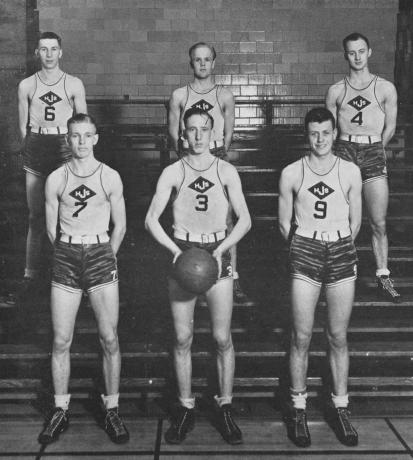Do sports build character or reveal it?
Regular readers will know how much of a sports guy I am, as I have probably spent about a third of my time writing about sports related topics on the blog over the years. And I spend way too much time in the Winter/Spring on NBA League Pass and poring over the box scores. But it's good to have a hobby I guess.
Yes, I love sports but I also don't take them too seriously. I didn't back when I was playing organized sports, and I don't now as a fan and as a parent of a son who participates in a few high school sports. Sports are awesome, but they are just games in the end. And generally not all that important. This may or may not be my HS team
This may or may not be my HS team
That perspective is why I never really liked the often repeated maxims (usually spouted by coaches, and most frequently football coaches) about how sports build character, create leaders, or somehow make people 'better' by virtue of their participation. Like somehow 'commanding' a huddle miraculously transforms someone into General Patton or Margaret Thatcher or Abe Lincoln. I just never bought in. Some of the biggest jamokes I know played sports in high school. And also some of the most successful, accomplished people I know as well. I don't think sports participation really meant all the much in determining any of that.
Turns out at least one recent research study has come to the same conclusion. In an Institute of Labor Economics paper titled 'Do High School Sports Build or Reveal Character?', authors Michael Ransom and Tyler Ransom examine three large, national, and longitudinal data sets of high school students to come to the conclusion that high school athletes are no more likely to attend college, earn higher wages, or participate in the labor force than non-athletes.
Here's an excerpt from their findings:
We revisit the literature on the long-run effects of high school sports participation on educational attainment, labor market outcomes, and adult health behaviors. Many previous studies have found positive effects in each of these dimensions by either assuming that sports participation is exogenous (conditional on other observable characteristics), or by making use of instrumental variables that are unlikely to be valid.
We analyze three separate nationally representative longitudinal surveys that link participation in high school sports with later-life outcomes: the NLSY79, the NELS:88, and the Add Health. We employ an econometric technique that empirically tests the sensitivity of the selection on observables assumption and find that estimates of the returns to sports participation are highly sensitive to this assumption. Specifically, we find that, for most educational and labor market outcomes, if the correlation between sports participation and unobservables is only a fraction of the correlation between sports and observables, the effect of sports participation cannot be statistically differentiated from zero. Thus, we conclude that a causal effect of sports participation is unlikely, and that most of the findings of the literature that report beneficial impacts represent the effects of selection into sports.
Or, in simpler language the authors conclude that the kinds of people who are likely to be successful later in life for whatever set of reasons/attributes that make people successful sometimes participate in high school sports, and sometimes they do not. They may be part of the drama club or the chess club or maybe the 'leave me alone, I am just doing time until I can get out of here' club. But sports themselves do not function as some kind of magical leadership development or success training program that make athletes more likely than non-athletes successful later in life.
And this conclusion goes against most of the mainstream thinking (at least it seems to me) about the true benefits and value of sports, particularly youth sports.
Sports are awesome. They are fun. You can make some great friends and learn some things too.
But lots of other things are awesome, fun, social, and provide great learning opportunities too. It is good to keep that in mind, especially if you are involved at all and at any level in youth sports.
Happy Thursday. Have all your holiday preparations nailed down yet?

 Steve
Steve
Reader Comments (3)
pokemon go iphone hack
http://getiphoneipa.com/pokemon-go-ipa-hack/
Sports really helps you in a) get used to losing b) keep on trying, despite losing.
Been doing HS sports, then college, Currently just running for my own pleasure, mostly with folks from a running store near me. It's fun and gives me energy
This can be done through text Infinite Craft messages, emails, or social media. Cyberbullying can have a negative impact on the victim's mental health.